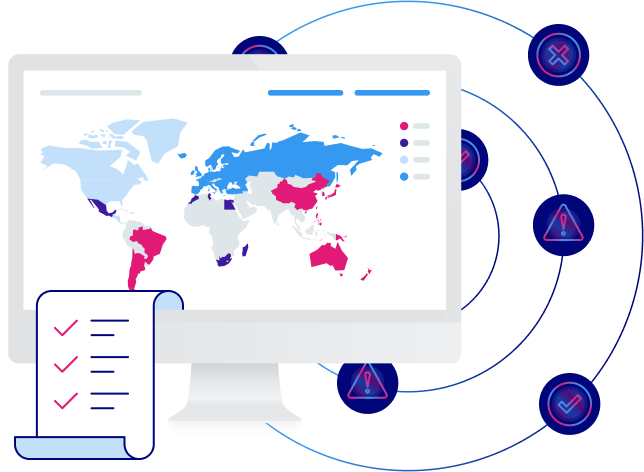-
Solutions
- AI Governance
- Geo-Specific Cookie Banner
- Consumer Preference Management
- Data Subject Request Automation
- Data Mapping and Vendor Risk Management
- Privacy, Vendor, and Risk Assessments
- Privacy Program Management
- Regulatory Guidance
- Privacy Program Consulting
- Certifications and Verifications
- International Data Transfers
Forrester TEI ROI of Privacy ReportTrustArc commissioned a Forrester study to analyze the potential benefits of using our platform and the Forrester team found ROI linked to efficiency, compliance, and decreased cost in data breaches.
Read the report -
Products Products Consent & Consumer Rights Overview
Experience automated privacy solutions that simplify compliance, minimize risk, and enhance customer trust across your digital landscape.
- Cookie Consent Manager Effortlessly manage cookie consent for global compliance, ensuring a secure, personalized browsing experience.
- Consent & Preference Manager Easily manage customer consent across brands and platforms—email, mobile, advertising—with a centralized repository.
- Individual Rights Manager Automate and streamline DSR workflows to ensure compliance and show your commitment to customer rights.
Products Privacy & Data Governance OverviewSimplify privacy management. Stay ahead of regulations. Ensure data governance with cutting-edge solutions.
- PrivacyCentral Centralize privacy tasks, automate your program, and seamlessly align with laws and regulations.
- Data Inventory Hub and Risk Profile Gain full visibility and control of your data and accurately identify and mitigate risks.
- Assessment Manager Automate and score privacy assessments like PIAs and AI Risk, streamlining your compliance workflow.
- Nymity Research Get instant access to the latest in privacy regulations, legal summaries, and operational templates.
Products Assurance & Certifications OverviewBoost brand trust with TRUSTe's certifications, showing your privacy commitment with the most recognizable seal, assessed by unbiased experts.
- Dispute Resolution
- TRUSTe Enterprise Privacy Certification
- TRUSTe EDAA Privacy Certification
- TRUSTe APEC CBPR and PRP Certification
- TRUSTe Data Collection Certification
- CCPA/CPRA Validation
- Data Privacy Framework Verification
- GDPR Validation
- Digital Advertising Alliance Validation
- Responsible AI Certification
-
Regulations
- EU General Data Protection Regulation (GDPR)
- California Consumer Privacy Act (CCPA)
- Virginia Consumer Data Protection Act (CDPA)
- NIST AI Framework
- ISO/IEC 27001
Data Privacy Framework (DPF)Transatlantic data transfer mechanism for EU-U.S., UK, and Swiss-U.S. commerce.
Learn more - Resources
- Contact us
Data Protection Act (DPA)
One of the goals of the DPA, among others, is to protect the fundamental rights, freedoms, and interests of data subjects as ensured by the 1999 Constitution of Nigeria.
Are you subject to the DPA?
Nigeria’s DPA applies to: (1) the data controller or data processor who is domiciled, ordinarily resident, or ordinarily operating in Nigeria, (2) the processing of personal data within Nigeria, and (3) the data controller of the data processor who is not domiciled, ordinarily resident, or ordinarily operating in Nigeria, but is processing personal data of a data subject in Nigeria.
Key obligations under the DPA
Data protection impact assessment
The Act emphasizes the necessity of conducting a data protection impact assessment (DPIA) when processing personal data poses a potential high risk to the rights and freedoms of data subjects based on its nature. The Act requires the controller to seek consultation with the Commission before proceeding with the processing if the DPIA identifies a high risk.
Data breach notification
In the event a breach occurs, the DPA requires the data processor to inform the controller or the engaging data processor promptly about the breach’s details and address any information inquiries from them. If the breach is expected to pose a risk to individuals’ rights, the controller must notify the Commission within 72 hours of becoming aware, with the ability to extend if necessary to properly assess the breach’s extent.
Appointment of a Data Protection Officer (DPO)
Controllers and data processors are required to appoint a DPO, responsible for overseeing compliance with the DPA and serving as a point of contact for data subjects and regulatory authorities.
Cross-border data transfers
According to the DPA, the transfer of personal data from Nigeria to another country is permissible only if the recipient of the data is bound by a law, binding corporate rules, contractual clauses, codes of conduct, or certification mechanisms that ensure an adequate level of protection for the personal data. The Act also grants the Commission the authority to periodically compile a ‘blacklist,’ identifying jurisdictions or entities that do not comply with the legislation.
Records of processing activities
Controllers and data processors must maintain records of their processing activities, including information about the purposes of processing, categories of data subjects, categories of personal data processed, recipients of personal data, and security measures implemented. The controller and data processor are also mandated to keep a record of all personal data breaches.

Building Trust and Competitive Advantage: The Value of Privacy Certifications
Join our experts in this webinar as they go over the importance of how privacy certifications can unlock business value and help you stay ahead of the competition in today’s privacy-conscious landscape.
Achieve compliance
-
Complete and maintain a data inventory Automate with TrustArc’s Data Inventory Hub. Save time and reduce risk with automated data flow mapping, risk analysis, and remediation for personal data processes and general activities associated.
-
Privacy program development and compliance management Identify gaps and track compliance with PrivacyCentral – assess regulation specifics and automatically get insights and reporting for a sustainable privacy program.
-
Regulatory guidance and operational templates Stay ahead of regulatory changes with expert guidance, ensuring your security and privacy practices remain compliant and up to date. Utilize expert written operational templates for sample policies, checklists, and more.

Related resources
View all resourcesThe information provided does not, and is not intended to, constitute legal advice. Instead, all information, content, and materials presented are for general informational purposes only.



